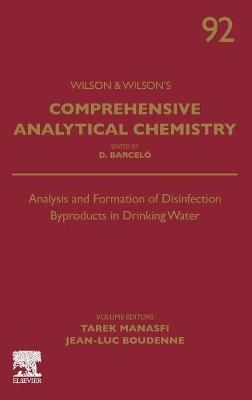
Analysis and Formation of Disinfection Byproducts in Drinking Water
Elsevier Science Ltd (Verlag)
978-0-444-64343-8 (ISBN)
Researchers, water treatment specialists, and regulators will find in this book a valuable and compact resource on several key topics regarding the formation, identification, quantification, and mitigation of DBPs.
Tarek Manasfi works as a postdoctoral scientist at Eawag - the Swiss Federal Institute of Aquatic Science and Technology. Tarek completed his PhD studies at Aix-Marseille University, France where he investigated the fate of organic UV filters in chlorinated bromide-rich waters and their contribution to the formation of toxic disinfection byproducts. Tarek was the recipient of the Eawag Postdoctoral Fellowship in 2018 and he is currently funded by a European Marie Curie Individual Fellowship. His research focuses on oxidation and disinfection processes in different contexts including advanced wastewater treatment. Tarek investigates the formation mechanisms and kinetics of toxic (by)products generated during oxidation processes. In his research, Tarek applies tools such as effect-directed analysis integrating advanced chemical and toxicological analyses in order to identify toxic compounds formed during such processes. Tarek has received multiple awards for his work including the 2016 PhD student award of the French Chemical Society (SCF), Region of Provence-Alpes-Côte d’Azur. Tarek has served as guest editor for special issues in multiple high-impact journals (e.g., Environment International), and he is currently an editorial board member of the International Journal of Hygiene and Environmental health. Tarek is currently serving as the co-chairman of the 2021 Gordon Research Seminar on Water Disinfection, Byproducts, and Health (deferred to 2023). Jean-Luc Boudenne holds a 3rd cycle doctorate in environmental analytical chemistry and an expert degree in Health and Environmental Chemistry of University of Provence, and a Master of Physical Chemistry of the University of Lille. Since 2012, he is Full Professor in environmental analytical chemistry at Aix-Marseille University, manager of the team “Transfer, Reactivity and Analysis of Micropollutants in the Environment (TRAME) in the Laboratory of Environmental Chemistry (Marseille, France), and, since 2003, a member of the Expert Committee “Waters at Anses (French National Agency for Environmental and Occupational Health Safety). He has been president and member of several working groups within European bodies (Anses, European Centre for Environment and Health-WHO, Gesamp- UNO), in the field of the analysis, occurrence and toxicity of disinfection by-products in various environments (seawater, drinking waters and swimming pool waters). His research fields deal with the study of chemical and physical disinfectants ’reactivity with natural and/or anthropogenic organic matter, and on their impacts on the formation of disinfection by-products. His research also implies the development of “conventional and “alternative analytical methods for on-site and/or real-time determination of water quality based on flow analysis systems (MSFIA, SIA, MPFS, ...), development of sample pre-treatment procedures (preconcentration of targeted analytes onto modified supports; photo-oxidation of non-absorbing compounds; derivative methods for metallic ion or functional group determination), and development of chromatographic methods combined with mass-spectrometric detections. He has published over 80 papers and chapter books in analytical chemistry and environmental sciences and is co-author of 7 international published patents.
1. Non-target screening and novel methods based on mass spectrometry detection for identification of unknown disinfection byproducts
Cristina Postigo and Susan D. Richardson
2. Inorganic chloramines analysis in water
Jean-Luc Boudenne, Fabien Robert-Peillard and Bruno Coulomb
3. Mechanisms and byproduct formation in the application of chlorine dioxide
Mohammad Sajjad Abdighahroudi, Mischa Jütte, Katharina Hupperich, Xenia Mutke, Torsten C. Schmidt and Holger V. Lutze
4. Ozonation in drinking water treatment: An overview of general and practical aspects, mechanisms, kinetics, and byproduct formation
Tarek Manasfi
5. Influence of bromide and iodide on the formation of disinfection by-products in drinking water treatment
Justine Criquet and Sébastien Allard
6. Disinfection byproducts in potable reuse
Maria José Farré and Wolfgang Gernjak
| Erscheinungsdatum | 29.03.2021 |
|---|---|
| Reihe/Serie | Comprehensive Analytical Chemistry |
| Verlagsort | Oxford |
| Sprache | englisch |
| Maße | 152 x 229 mm |
| Gewicht | 400 g |
| Themenwelt | Naturwissenschaften ► Chemie ► Analytische Chemie |
| ISBN-10 | 0-444-64343-5 / 0444643435 |
| ISBN-13 | 978-0-444-64343-8 / 9780444643438 |
| Zustand | Neuware |
| Informationen gemäß Produktsicherheitsverordnung (GPSR) | |
| Haben Sie eine Frage zum Produkt? |
aus dem Bereich


